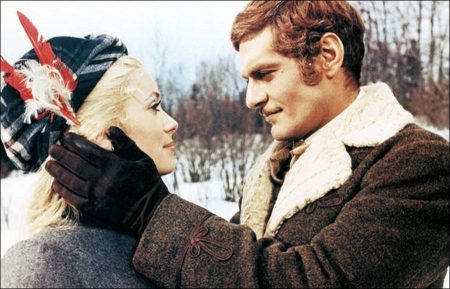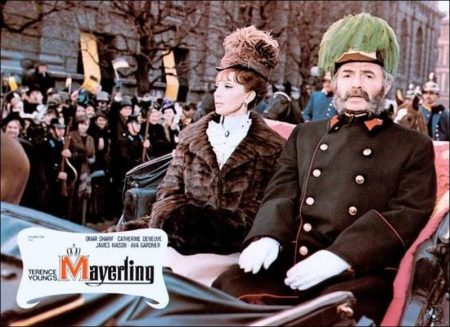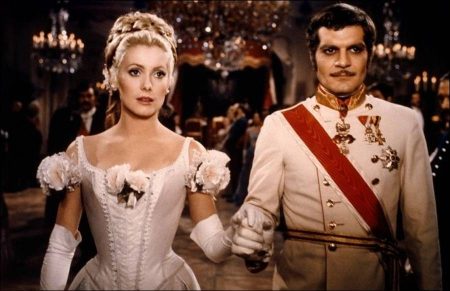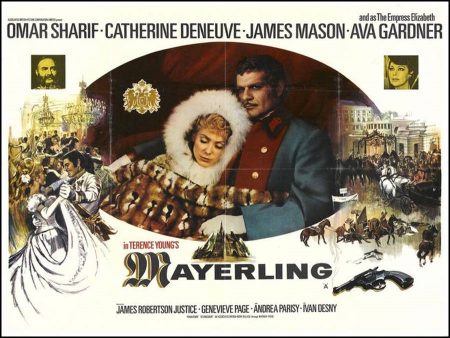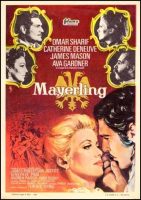Taglines: No one woman could satisfy him… until he fell in love.
Mayerling movie storyline. It’s the late nineteenth century Austria. The Emperor Franz-Joseph and his son, the Crown Prince, Archduke Rudolf, have never seen eye to eye. While the Emperor retains the traditions of the empire in the rapidly changing world keeping it a police state, Rudolf is liberal, wanting to see the people have a say in what happens in their lives. Rudolf even rejected the Emperor’s choice of a Spanish wife for him, he instead choosing Belgian Stephanie as his wife, that marriage which he himself never saw and will never see as anything more than a political alliance, Stephanie who he considers a shrew.
While Rudolf has almost an unhealthy infatuation with his mother, the Empress Elizabeth, she has largely been an absent figure from Vienna and thus his life. As Franz-Joseph has had his steady mistress in Elizabeth’s frequent absences, he has allowed Rudolf to have the same in the form of actress Mitzi Kaspar as the Emperor knows she could never be more than a dalliance and as she retains a certain balance within the royal house.
Things change when Rudolf meets twenty year old Baroness Maria Vetsera. Their attraction begins as a clandestine affair which then grows into love which Rudolf increasingly flaunts in public in wanting always to be with her. This does not sit well with Franz-Joseph, his secret police who do whatever they need to retain the Emperor’s natural order.
As such, Rudolf tries to find options to make Maria his wife, one, with the help of his good friend, Edward, the Prince of Wales, to live as commoners in England, or two, to support the imminent and secret uprising in Hungary, they who want Rudolf as their King, which in realistic terms means an act of treason on Rudolf’s part against his father.
Mayerling is a 1968 romantic tragedy film starring Omar Sharif, Catherine Deneuve, James Mason, Ava Gardner, Geneviève Page, James Robertson Justice and Andréa Parisy. It was written and directed by Terence Young. The film was made by Les Films Corona and Winchester and distributed by Metro-Goldwyn-Mayer. It was based on the novels Mayerling by Claude Anet and L’Archiduc by Michel Arnold and the 1936 film Mayerling, directed by Anatole Litvak, which dealt with the real-life Mayerling Incident.
Film Review for Mayerling
Attain peace of mind before seeing “Mayerling.” Compose yourself. This is a very long, slow, passive film, and it’s going to be difficult to sit through. I guess it’s worth it, though, for traditional kinds of reasons.
It tells a tale out of history. It’s about beautiful doomed people. It is played by actors with grace and style: Catherine Deneuve (yes!), Ava Gardner, James Mason — even Omar Sharif has style for a change. It has magnificent location settings, great scenery and costumes, spellbinding photography and, in short, everything except a story.
“Mayerling” is about the final days of the Austro-Hungarian Empire. All movies about the final days of empires have got to be filled with brooding irony; it’s the custom. “Mayerling” broods overmuch. Its characters wander listlessly about Vienna, sighing and reciting bitter epigrams. “Be quiet,” Ava Gardner says, “and after a while you will hear a noise. Perhaps a door closing or a spoon dropping. We are never entirely alone.” Alas.
The situation is this. Franz-Joseph (James Mason) rules the empire with little thought for the future. His son (Sharif) complains he has no power and is a stuffed puppet. He falls in love with Catherine Deneuve. But the marriage cannot be because he’s already married, for one thing. A royal scandal results. Emissaries in the night tempt Sharif with the idea of revolution.
He agrees: He will join in revolt against his father and renounce the throne. “Would you do anything for me?” he asks Catherine. “Yes, why?” she says. “Because I just have — for you,” he replies with brooding irony. No one with an undeveloped appreciation for brooding irony had better see “Mayerling” at all.
Mayerling (1969)
Directed by: Terence Young
Starring: Omar Sharif, Catherine Deneuve, James Mason, Ava Gardner, James Robertson Justice, Geneviève Page, Fabienne Dali, Véronique Vendell, Irene von Meyendorf, Bernard Lajarrige
Screenplay by: Terence Young
Production Design by: Georges Wakhévitch
Cinematography by: Henri Alekan
Film Editing by: Monique Bonnot
Costume Design by: Marcel Escoffier
Art Direction by: Maurice Colasson, Tony Roman
Music by: Francis Lai
MPAA Rating: PG-13 for sex-related scenes.
Distributed by: Warner-Pathé (UK), Valoria Films (France), Metro-Goldwyn-Mayer (USA)
Release Date: February 13, 1969
Views: 301
